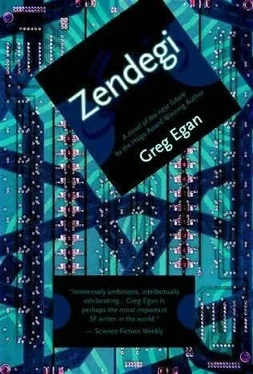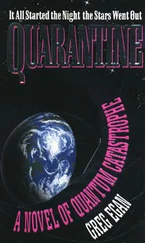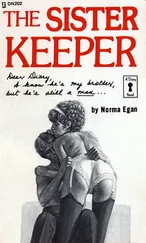The senior officer was carrying a megaphone; he raised it to his lips. ‘You are instructed by the Chief of Police to move on,’ Behrouz translated. ‘This gathering is a distraction for drivers and a threat to public safety.’
‘We’re big fans of public safety!’ one demonstrator shouted in reply. ‘Drivers should keep their eyes on the road and their hands on the wheel at all times!’ Majid and the others laughed, and Martin saw the two junior officers struggling to keep themselves from cracking up.
‘You are instructed to disperse,’ the senior officer persisted. ‘This is a reasonable and lawful request.’ He didn’t sound particularly vehement, or particularly confident that anyone would obey him.
‘People like our signs!’ Majid called back. ‘We’re not distracting anyone.’ One of the cops came over and asked to check Martin’s papers, but he wasn’t belligerent about it, chatting matter-of-factly with Behrouz and trying out his English.
‘I like Australia,’ he said, returning Martin’s passport. ‘We beat you at football last year.’
‘Mubaarak,’ Martin replied. Congratulations. He’d long ago given up hope of finding a country anywhere in the world where it was safe to tell total strangers that he had no interest in sport whatsoever.
A small motorbike with a pillion passenger drove up onto the grass, closely followed by three more. The young men on the bikes wore dark glasses, army boots and green-and-brown camouflage trousers; some had full beards, but most were clean-shaven. Martin couldn’t see any firearms, but at least two of the men were carrying batons.
‘Basij or Ansar-e-Hezbollah?’ he wondered aloud; both paramilitary groups had a habit of showing up at demonstrations. Martin was expecting Behrouz to answer, but it was the cop who replied, ‘Basij.’
Two of the Basijis strode to the front of the assembly. The policemen did nothing, but Majid went to join the ranks of his companions. Martin couldn’t see Zahra any more; there were too many people crowding the island. He switched his phone to video mode, hoping the battery would hold out.
‘Put down the signs, you traitors!’ one Basiji began. ‘We’ve had the election! The honest Iranian people have spoken. We don’t need you parasites to tell us what to think.’ Martin heard the buzz of small engines yet again; more Basijis were arriving.
Some of the demonstrators began jeering angrily. There was too much for Behrouz to translate at once, and most of the fragments he offered sounded so idiomatic or obscure that they added nothing to the obvious body language. Martin tensed; he knew what was coming next. In Pakistan he’d covered protests that ended in gunfire, in bomb blasts, in visits to the morgue, but he hadn’t become desensitised; none of that had inured him to lesser acts of violence. Before the first blow had even been struck a voice inside him was already screaming at the Basijis to stop.
Instead, they started: with fists, batons, boots. They were aiming for the placards, but they pummelled and tore at everything that lay in their path. The demonstrators were not outnumbered, but they were hemmed in on all sides. They were attempting to regroup to protect the women, and at the same time trying to hold on to the placards and keep them aloft as a gesture of defiance. The men being beaten on the perimeter were quickly becoming dazed and bloody, but it was hard for their comrades to pull them back from the front line without ceding ground. Martin heard brakes squealing. He swung around. A tarpaulin-covered truck had stopped dead in the road, and for one terrible moment he had a vision of soldiers with automatic weapons piling out. But nobody emerged from the back of the truck, just the driver and two companions from the cab. They were solidly built middle-aged men, in work clothes, not uniforms, and they threw themselves into the fray with a grim, unflinching determination that reminded Martin of one of his uncles trying to separate feral cousins at a family gathering thirty years before. He filmed one of the men grabbing a baton-wielding Basiji under the arms and flinging him back onto the grass as if hefting a sack of potatoes.
In rapid succession there was a mosquito whine of more bikes arriving, angry shouting from the road, then another group of civilians joining the fight. Underneath his struggle to remain detached and simply record the details, Martin felt a mixture of admiration and dread. Most Iranians had no tolerance for seeing defenceless people being beaten, and they weren’t shy about taking on thugs. But one punch-up on Ferdowsi Square would not settle anything. Unless someone within the regime came up with a political solution, people’s frustration at the repression and hypocrisy they faced would continue to escalate – until the only possible response was a full-scale, bloody crackdown: 2009 all over again.
Martin could see nothing at ground level now but a scrum of backs and furious elbows, but someone deep within the pack, propped up by companions to a visible height, was still holding one of the placards over their heads. As Martin tilted the phone to capture the sight, a Basiji turned and glared at him.
‘Hey, motherfucker! Hand it over!’ He seemed to have learnt English from one of Omar’s DVDs – perhaps the mujahedin-friendly Rambo III. As the Basiji approached, baton in hand, Martin lowered the phone and looked around for an escape route, but between the vehicles parked on the roadside and the brawling mob spread across the grass, he was fenced in.
Behrouz caught his eye; in all the turmoil they’d become separated and he’d ended up about twenty metres away, near the edge of the square’s ornamental pool. He held up his hand and Martin tossed the phone to him, half expecting it to end up in the water as punishment for his lifelong neglect of ball skills. But Behrouz caught it, and without a moment’s hesitation dashed out into the traffic and vanished behind an approaching truck. Martin froze, waiting for an ominous squeal and a thump, but the sound never came.
‘Khub bazi,’ muttered the cop admiringly. The Basiji grimaced and spat on the ground, but did not give chase. Martin’s heart was pounding. Behrouz had his own keys to the car, which was parked a few hundred metres away; he’d get the phone to safety, then come back.
Martin turned to the cop. ‘So, how do you feel when passing truck drivers have to do your job for you?’
The cop looked wounded. He held out his hands, wrists together. We can’t interfere. Our hands are tied.
Nasim called in sick and prepared to spend the day at home, watching rumours and snippets of news ricochet between the satellite channels and the Persian blogosphere. She didn’t have to go through the charade of making her voice sound pitifully hoarse and congested; the department’s new personnel system made it as simple as choosing an option on her phone’s menu, and for a single day’s absence she wouldn’t need a medical certificate.
The truth was, she really did have a cold coming on, which always happened when she was short of sleep, but normally she would have brushed off the symptoms and joined her colleagues in the lab. Her mother was more disciplined; she too had stayed up half the night, channel-hopping beside Nasim, but she’d still gone in to work. Her students needed her, she’d declared. Ordinary life couldn’t grind to a halt just because there were people battling for the future of their country half a world away.
Nasim sat in the living room with her laptop beside her, listening for the ping of News Alerts while she cycled the TV between the BBC, Al Jazeera and IRIB. The Iranian government had ordered the country’s internet providers to shut down all domestic accounts and coffeenets, but they had not yet disabled business access or international phone lines, so journalists and some bloggers were still getting news out. Nasim suspected that the government didn’t really care; they were far more interested in keeping their own people in the dark than they were in fretting over international opinion.
Читать дальше











